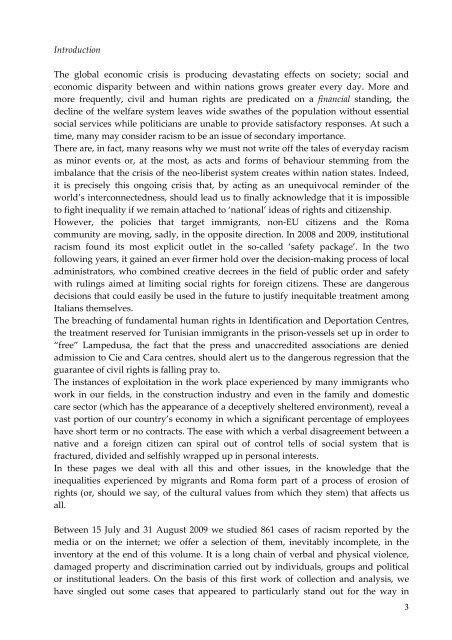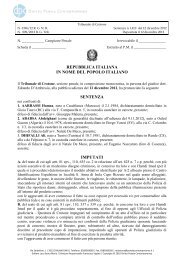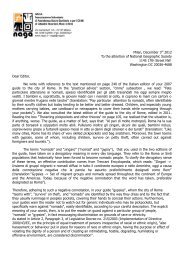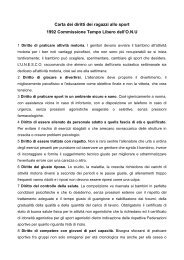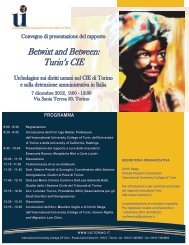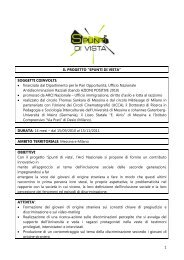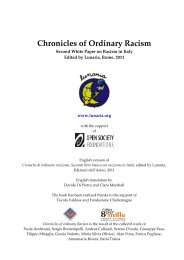Chronicles of ordinary racism 2011 - Cronache di ordinario razzismo
Chronicles of ordinary racism 2011 - Cronache di ordinario razzismo
Chronicles of ordinary racism 2011 - Cronache di ordinario razzismo
- No tags were found...
You also want an ePaper? Increase the reach of your titles
YUMPU automatically turns print PDFs into web optimized ePapers that Google loves.
Introduction<br />
The global economic crisis is producing devastating effects on society; social and<br />
economic <strong>di</strong>sparity between and within nations grows greater every day. More and<br />
more frequently, civil and human rights are pre<strong>di</strong>cated on a financial stan<strong>di</strong>ng, the<br />
decline <strong>of</strong> the welfare system leaves wide swathes <strong>of</strong> the population without essential<br />
social services while politicians are unable to provide satisfactory responses. At such a<br />
time, many may consider <strong>racism</strong> to be an issue <strong>of</strong> secondary importance.<br />
There are, in fact, many reasons why we must not write <strong>of</strong>f the tales <strong>of</strong> everyday <strong>racism</strong><br />
as minor events or, at the most, as acts and forms <strong>of</strong> behaviour stemming from the<br />
imbalance that the crisis <strong>of</strong> the neo‐liberist system creates within nation states. Indeed,<br />
it is precisely this ongoing crisis that, by acting as an unequivocal reminder <strong>of</strong> the<br />
world’s interconnectedness, should lead us to finally acknowledge that it is impossible<br />
to fight inequality if we remain attached to ‘national’ ideas <strong>of</strong> rights and citizenship.<br />
However, the policies that target immigrants, non‐EU citizens and the Roma<br />
community are moving, sadly, in the opposite <strong>di</strong>rection. In 2008 and 2009, institutional<br />
<strong>racism</strong> found its most explicit outlet in the so‐called ‘safety package’. In the two<br />
following years, it gained an ever firmer hold over the decision‐making process <strong>of</strong> local<br />
administrators, who combined creative decrees in the field <strong>of</strong> public order and safety<br />
with rulings aimed at limiting social rights for foreign citizens. These are dangerous<br />
decisions that could easily be used in the future to justify inequitable treatment among<br />
Italians themselves.<br />
The breaching <strong>of</strong> fundamental human rights in Identification and Deportation Centres,<br />
the treatment reserved for Tunisian immigrants in the prison‐vessels set up in order to<br />
“free” Lampedusa, the fact that the press and unaccre<strong>di</strong>ted associations are denied<br />
admission to Cie and Cara centres, should alert us to the dangerous regression that the<br />
guarantee <strong>of</strong> civil rights is falling pray to.<br />
The instances <strong>of</strong> exploitation in the work place experienced by many immigrants who<br />
work in our fields, in the construction industry and even in the family and domestic<br />
care sector (which has the appearance <strong>of</strong> a deceptively sheltered environment), reveal a<br />
vast portion <strong>of</strong> our country’s economy in which a significant percentage <strong>of</strong> employees<br />
have short term or no contracts. The ease with which a verbal <strong>di</strong>sagreement between a<br />
native and a foreign citizen can spiral out <strong>of</strong> control tells <strong>of</strong> social system that is<br />
fractured, <strong>di</strong>vided and selfishly wrapped up in personal interests.<br />
In these pages we deal with all this and other issues, in the knowledge that the<br />
inequalities experienced by migrants and Roma form part <strong>of</strong> a process <strong>of</strong> erosion <strong>of</strong><br />
rights (or, should we say, <strong>of</strong> the cultural values from which they stem) that affects us<br />
all.<br />
Between 15 July and 31 August 2009 we stu<strong>di</strong>ed 861 cases <strong>of</strong> <strong>racism</strong> reported by the<br />
me<strong>di</strong>a or on the internet; we <strong>of</strong>fer a selection <strong>of</strong> them, inevitably incomplete, in the<br />
inventory at the end <strong>of</strong> this volume. It is a long chain <strong>of</strong> verbal and physical violence,<br />
damaged property and <strong>di</strong>scrimination carried out by in<strong>di</strong>viduals, groups and political<br />
or institutional leaders. On the basis <strong>of</strong> this first work <strong>of</strong> collection and analysis, we<br />
have singled out some cases that appeared to particularly stand out for the way in<br />
3


